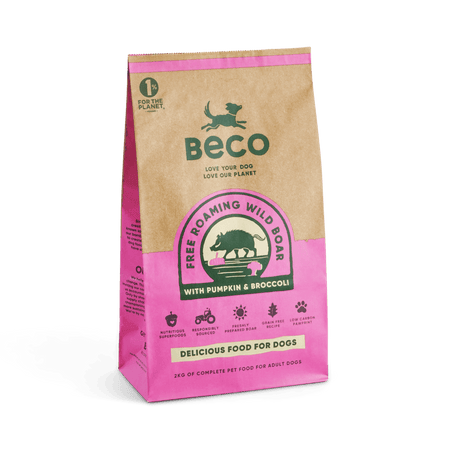Key Summary
Novel proteins, like kangaroo or rabbit, are less common and reduce allergies in dogs due to their rarity in diets.
Novel protein dog food adds variety, enhancing nutrient absorption and offering unique health perks. This diversification is nutritionally and mentally beneficial.
Choosing the right novel protein involves considering the dog's age, breed, and health. A vet's guidance and a gradual introduction are key.
Commonly consumed proteins that are not considered novel include beef, chicken, and lamb. These are more likely to cause allergic reactions in dogs.
What are Novel Proteins?
Novel proteins are unique protein sources to which dogs have had limited exposure. These proteins are less likely to cause food allergies or sensitivities because they are not commonly found in standard dog diets.
The principle behind novel proteins is to introduce ingredients that the dog’s immune system has not previously encountered, thereby reducing the risk of an allergic reaction. This strategy is particularly beneficial for reducing the likelihood of allergic reactions, as the immune system is less prone to recognise these novel proteins as allergens.
Did you know? The more obscure the protein the better when it comes to feeding a sensitive dog. Foods that are less commonly heard of, such as kangaroo, can be the perfect remedy to upset tummies and skin conditions.
Examples of novel proteins

Common examples of novel proteins include meats like kangaroo, venison, rabbit, and even less conventional sources such as bison, duck, and various fish species like salmon or herring. In recent times, even more unique options like insect-based proteins are being explored.
Benefits of Novel Protein Dog Food
Novel protein dog food offers a wide range of benefits, each contributing to the overall well-being of dogs, particularly those with specific dietary needs. Here’s a detailed look at the key benefits:
1. Reduced Risk of Food Intolerances and Allergies
Since novel proteins are generally new to a dog's system, they are less likely to trigger allergic reactions. Traditional dog food often contains common allergens like beef, chicken, or wheat, which can cause adverse reactions in some dogs.
Switching to a novel protein source can alleviate symptoms like skin irritation, gastrointestinal distress, and chronic ear infections. This is especially crucial for dogs with a history of allergies or food sensitivities.
2. Diversification of Diet
Introducing novel protein dog food into your pet's diet adds variety, which is not just nutritionally beneficial but also mentally stimulating for them. A diverse diet can prevent boredom with food and stimulate a dog’s interest during meal times.
Offering a wide variety of meals also ensures a broader range of nutrients, for example, a higher crude protein consumption, contributing to a more balanced diet. It also provides an opportunity to identify what best suits the dog’s individual dietary needs.
3. Lean and Clean Protein Sources
Many novel proteins are leaner and less processed compared to traditional protein sources. These lean proteins contribute to better weight management and overall health. They are often lower in saturated fats, which is beneficial for dogs with weight or heart issues.
Additionally, being less processed means these foods retain more of their natural nutrients, offering higher nutritional value, which is particularly important for maintaining muscle mass and overall vitality in dogs.
4. Suitable for Sensitive Stomachs
Dogs with sensitive stomachs often respond well to novel protein diets. These proteins are usually more digestible and gentler on a dog's gastrointestinal system which (thankfully!) means fewer instances of upset stomachs, diarrhoea, or vomiting.
For owners of dogs with chronic digestive issues, novel protein dog food can be a game-changer, offering relief and comfort to their pets.
5. Potential for Novel Health Benefits
Each novel protein source brings its own unique set of nutrients and health benefits. For instance, proteins like salmon or cod are rich in omega-3 fatty acids, which are known for improving skin and coat health, and supporting joint health. Other novel proteins might offer different amino acid profiles or unique vitamins and minerals, contributing to a more holistic approach to canine health.
6. Encouraging Ethical and Sustainable Choices
Some novel protein sources, like insect-based proteins, offer a more sustainable and ethical alternative to traditional meat proteins. These options have a lower environmental impact, consume fewer resources, and are becoming more available. For environmentally-conscious dog owners, this provides a way to care for their pets while also considering the broader impact on the planet.
Choosing Novel Protein Dog Food
Selecting the best novel protein dog food is a process that requires careful thought and attention to a variety of factors. Here are key considerations to keep in mind:
Consultation with a Veterinarian
Consulting a vet is crucial to understand your dog's dietary needs and health. They can advise on the suitability of novel protein diets for any sensitivities or allergies.
Gradual Introduction
Introduce novel proteins slowly to avoid digestive issues. Mix novel protein dog food with current food, gradually increasing the amount.
Prioritising Quality and Standards
Choose high-quality dog food from reputable brands, adhering to Food Standards Agency standards. Ensure the product meets nutritional and safety requirements.
Researching and Reading Reviews
Research and read reviews to find the best novel protein dog food. Other dog owners’ experiences can provide insights into different products’ quality and effectiveness.
Frequently Asked Questions (FAQs)
How Do I Know if My Dog Needs a Novel Protein Diet?
If your dog shows signs of food allergies or sensitivities, such as itching, digestive issues, or poor coat quality, a novel protein diet may be recommended.
What Protein Sources are Not Considered Novel?
A good way to identify a novel protein source is to remember that these are foods that are not commonly found in commercial dog food. For example, chicken, beef, and lamb are not considered novel protein sources.
Turkey however, is a novel protein source as this is a great alternative for the more commonly used chicken. Switching to a fish, such as salmon, would also be a more novel protein.
What is a novel protein diet for dogs with IBD?
A novel protein diet for dogs with Inflammatory Bowel Disease (IBD) involves introducing protein sources that the dog has not been exposed to previously, in order to minimise immune system reactions and digestive upset. Your vet will be able to advise the best diet to try for your dog.
Dinner's Done
Novel protein dog food represents a significant advancement in managing food sensitivities and allergies in dogs. While not a universal solution, its benefits are notable, particularly when tailored to an individual dog’s dietary needs. As always, consulting with a veterinarian is the best approach to any dietary changes, ensuring the health and well-being of our canine companions.
If you are looking for novel protein dog foods to feed your pet, check out our selection here.




















